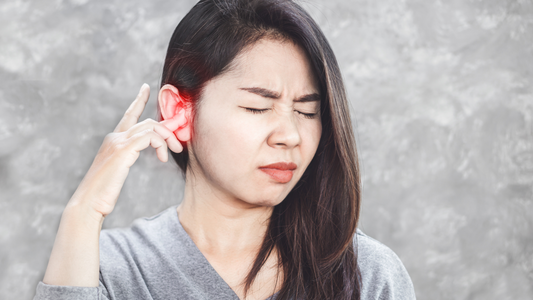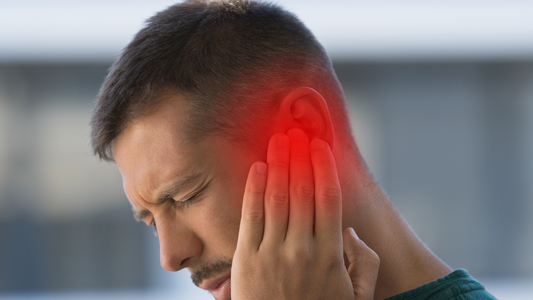Noticing that tunes don't sound quite right, or that listening to a friend's story is becoming a challenge? You're in good company. It's common for those of us past 55 to pick up on these subtle shifts. Sometimes, it's our ears giving us a nudge for a bit more attention. There's a medical term for it—sensorineural hearing loss, and it's not just a mouthful; it's a genuine concern for many. It's the culprit that messes with everyday sounds that ought to be crystal clear to us.
Let's talk about ear "hair cells" without getting too technical. Imagine your ear as a fine-tuned detective of sound. When this detective's gadgets (the hair cells) take a hit, it's not so sharp with sound anymore. What does it mean if you've got this kind of hearing loss creeping in? What's actually happening in there? It's about time we looked closer at these hair cells, recognized the warning signs, and understood the culprits. Brace yourself to tune in closely to what your hearing has been trying to tell you.
The Role of Hair Cells
Consider the inner ear as a precise instrument, with each hair cell resembling a specific string that vibrates with sound pitches. When sound waves make their way into the ear, they navigate a winding path to the cochlea, the home of our critically important hair cells. These cells dance to the beat of the sounds and relay the information to our auditory nerves, which in turn inform the brain about the sounds we’re hearing.
But let's discuss what occurs if these cells are damaged or lost. It's akin to a musical instrument missing some strings – the sound is no longer full or clear. Loud noises are often the culprit, inflicting so much damage that the cells can’t communicate effectively. Once they're shot, there’s no fixing them; they're gone, which is why conversations can sometimes feel like listening through heavy static, even in a peaceful setting. The impact of this can be akin to types of hearing loss—a condition we should all be mindful of protecting ourselves against.
Types of Sensorineural Hearing Loss
Picture a friend straining to follow a conversation in a bustling coffee shop, overwhelmed by the background noise. They could be grappling with sensorineural hearing loss, which manifests in different ways and affects individuals uniquely. Some folks have trouble hearing through both ears – called bilateral sensorineural hearing loss. It's akin to sounds being muffled, as if your ears are wrapped in layers of cotton. Then there’s the unilateral type, where one ear might be sharp as a tack, but the other one just can't keep up, turning locating noises into a guessing game. And we can't overlook asymmetrical sensorineural hearing loss, where hearing is diminished in both ears, but one ear is noticeably worse, reminiscent of a lopsided stereo balance that's lost its harmony.
These distinctions in hearing loss types aren't trivial – they influence everyday life in distinct ways. Recognizing which kind you're contending with is pivotal for managing it effectively. No matter the variant, they all have a knack for creeping up on you, often so gradual you might miss the signs. Catching yourself asking others to repeat themselves more frequently could be a nudge to perk up your ears to what they've been hinting at all along – it might just be the wake-up call to get your hearing checked.
Sensorineural Hearing Loss Symptoms
Noticing that the TV volume is cranked up a bit higher than usual? It might not be for the thrill of a home theater effect but could signal sensorineural hearing loss. You see, when someone is always nudging you to repeat yourself, particularly against the backdrop of a humming fridge or kids playing, it's often a red flag that the tiny hair cells in the ear are struggling to keep up with the cacophony of daily life.
It isn't always about how loud things are, though. Those high-pitched beeps from an oven timer or the distant tweet of a bird may start dropping off the auditory map. Many with this type of hearing loss catch themselves losing bits of conversation, or feeling out of step in social scenarios. And that nagging buzz or ringing in the ears during a quiet moment? That's tinnitus, another frequent sidekick of sensorineural hearing loss.
Imagine leaning in to catch the gist of a story and only grasping the laughter that bubbles up afterward. That's the quiet struggle simmering beneath the surface for many with this stealthy condition. It can slowly chip away at the richness of sounds, leaving folks feeling a tad off-balance, both literally and figuratively. For those like our proverbial TV-watcher and many others, catching on to these hints sooner rather than later could be crucial to dialing back into the full range of life's symphony.
Sensorineural Hearing Loss Causes
Struggling with not hearing as well as you used to? There's a bunch of reasons why this might be happening. Take loud music at a concert or a game with roaring fans – those are more than just fun times, they can be tough on your ears. Constant loud noise can gradually chip away at your hearing, harming your inner ear's hair cells.
Lifestyle and Environmental Factors
Your daily environment plays a role too. Called noise-induced sensorineural hearing loss, it's what happens after years of living in a noisy world. And those earbuds – cranking them up day after day doesn’t do your ears any favors, so watch that volume. Take a look at our article on what is noise pollution to learn more about the impact of loud environments on hearing.
Health and Medication
It's not all about outside noise though. Health issues and medications can also be the culprits. Surprising, right? Some medications can affect your hearing; we call these ototoxic. They might help with one thing but cause trouble with your ears.
Age and Genetics
Then there's just plain getting older – it happens to all of us. Over time, your hearing might not be what it once was; that's age-related sensorineural hearing loss. Family history can weigh in too, with some hearing problems passed down from one generation to the next.
Sorting out the cause of hearing loss is like solving a puzzle. Once you've got that figured out, you and your doctor can work together on how to manage it. Some things are beyond our control, sure, but there are steps we can all take to look after our hearing. What's one thing you can do today for your ears?
Does Sensorineural Hearing Loss Get Worse?

Concerned that difficulty understanding others at noisy family gatherings could progress from challenging to outright impossible? It's natural to question whether sensorineural hearing loss can intensify over time. The answer hinges on several factors, such as the initial cause and ongoing ear care efforts. Consider a cherished vase with a crack or two; rough handling might cause those cracks to expand beyond repair. Similarly, relentless exposure to noise pollution can irreparably harm the delicate hair cells in your ears.
Is Today Different from Tomorrow?
Your ears are like a team catching every sound wave. When some hair cells are damaged, think of it as having injured players on your team. They might still get the job done. But if they're continually stressed without respite, you risk losing more of them. What then, when your team can't field enough players? You start missing out on the full experience of hearing life around you. Acute health issues or head traumas can knock out more hair cells all at once.
What's the Game Plan?
Here's the strategy: treat your ears kindly by steering clear of loud environments and scheduling regular hearing check-ups. This can be a solid defense to safeguard the hearing you still have. Admittedly, there are factors beyond our control, like aging or genetics. But consider this: you apply sunscreen to protect your skin, so think about using ear protection when doing noisy chores or keeping the volume reasonable when enjoying music.
Indeed, sensorineural hearing loss can steadily increase, as if life's volume is being gradually turned down. By taking action today, you stand a better chance of staying engaged with the world, delighting in conversations, melodies, and those precious, sometimes whispered, words for as long as possible.
Conclusion
We’ve covered the route sound takes through the inner ear and what happens when hair cells are damaged. Understanding sensorineural hearing loss—its types, symptoms, causes, and the risk of progression—gives us the knowledge we need to take action. It's about safeguarding our hearing, getting help when we notice changes, and making adjustments in our lives to cope with the symptoms.
It could be as simple as keeping the music volume low, using ear protection, or steering clear of noisy places. Consider how, by being proactive, you could keep enjoying lively chats and the soothing sounds of nature. So, what can you do today to make sure the concert of life doesn't quietly dim?
Hold on to those joy-filled moments. Your hearing is a gift to preserve. So, focus on hearing wellness. And just to say, we’re here to listen—feel free to share your own story with hearing. Has taking action early on made a difference for you or someone close?
Wrapping Up on Hearing Hurdles
Who enjoys the hassle of straining to hear the TV or asking friends to repeat themselves? Not many of us, especially as we age. Tackling sensorineural hearing loss means not missing the nuances of a grandchild’s whisper or your favorite tune. It's straightforward: protecting our ears from loud noises and looking out for early signs of trouble matters more than we might think.
Sharing laughs and stories, enjoying music – aren't these some of the best parts of life? Taking care of our hearing keeps these joys alive. And if you're finding it tougher to catch every word or note, trying a hearing aid like one from HearWell Group could be a game-changer. What are you planning to do to keep life's soundtrack loud and clear?
Sources & References
- Kuhn, M., Heman-Ackah, S. E., Shaikh, J. A., & Roehm, P. C. (2011). Sudden sensorineural hearing loss: a review of diagnosis, treatment, and prognosis. Trends in Amplification, 15(3), 91-105. https://www.ncbi.nlm.nih.gov/pmc/articles/PMC4040829/
- Schreiber, B. E., Agrup, C., Haskard, D. O., & Luxon, L. M. (2010). Sudden sensorineural hearing loss. The Lancet, 375(9721), 1203-1211. https://www.thelancet.com/journals/lancet/article/PIIS0140-6736(09)62071-7/fulltext
- Furman, A. C., Kujawa, S. G., & Liberman, M. C. (2013). Noise-induced cochlear neuropathy is selective for fibers with low spontaneous rates. Journal of Neurophysiology, 110(3), 577-586. https://journals.physiology.org/doi/full/10.1152/jn.00164.2013

The Hear Well Group Research Team: Trusted Hearing Health Insights
Our experienced research team compiles hearing health data from credible, peer-reviewed sources and presents it in easy-to-understand terminology. We ensure accuracy and trustworthiness, providing up-to-date, evidence-based recommendations to enhance hearing care practices and inform our readers' hearing well-being decisions.


